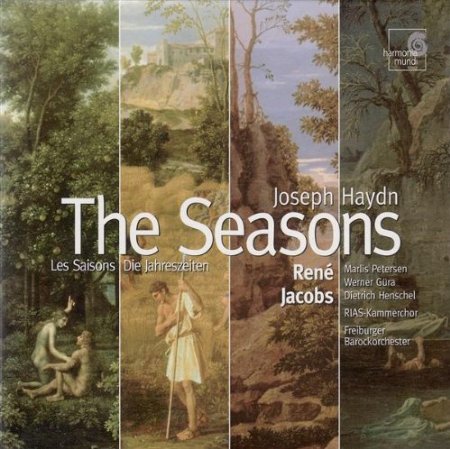Haydn (The) Seasons
A joyous new performance of The Seasons from the Award-winning René Jacobs
View record and artist detailsRecord and Artist Details
Composer or Director: Joseph Haydn
Genre:
Vocal
Label: Harmonia Mundi
Magazine Review Date: 13/2004
Media Format: Super Audio CD
Media Runtime: 125
Mastering:
Stereo
DDD
Catalogue Number: HMC80 1829/30

Tracks:
| Composition | Artist Credit |
|---|---|
| (Die) Jahreszeiten |
Joseph Haydn, Composer
Berlin RIAS Chamber Choir Dietrich Henschel, Baritone Freiburg Baroque Orchestra Joseph Haydn, Composer Marlis Petersen, Soprano René Jacobs, Conductor Werner Güra, Tenor |
Author: Edward Greenfield
It would be hard to imagine a more joyful account of Haydn’s culminating masterpiece. René Jacobs and his outstanding team perfectly capture the exuberance with which the composer seemed to be defying the years. Infectious rhythms bring out the fun of The Seasons from the start, and when in Simon’s first aria Haydn quotes from the slow movement of the Surprise Symphony, Jacobs nudges the music persuasively. And in the final chorus of ‘Summer’, the lowing cattle and quail’s cry, and chirping crickets and croaking frogs, sound witty, not naive.
In all this Jacobs is helped by a clear and immediate recording. If John Eliot Gardiner’s 1992 recording shares many of Jacobs’s qualities, his recording has less presence. The new release highlights the bold writing for brass and timpani in the choruses; the timbre of the Freiburgers’ valveless horns is very distinctive, notably in the drinking chorus at the end of ‘Autumn’, where Haydn introduces triangle and tambourine for good measure. The storm chorus in ‘Summer’ rivals Beethoven’s storm in the Pastoral, and the crescendo as the sun rises is thrilling.
The RIAS Chamber Choir is a fair match for Gardiner’s Monteverdi Choir, and the soloists are first-rate, fresh and youthful-sounding. Marlis Petersen’s bright, clear soprano is ideally flexible to cope with the coloratura passages in Hanne’s aria, ‘Welche Labung’, in ‘Summer’, while Werner Güra’s light tenor is well-suited to the role of Lukas; Dietrich Henschel brings a Lieder singer’s feeling for detail to Simon.
A final choice is a matter of taste – in its way Gardiner’s is just as recommendable – but this new account’s greater sense of relaxation and feeling for the fun in the writing make its claims second to none.
In all this Jacobs is helped by a clear and immediate recording. If John Eliot Gardiner’s 1992 recording shares many of Jacobs’s qualities, his recording has less presence. The new release highlights the bold writing for brass and timpani in the choruses; the timbre of the Freiburgers’ valveless horns is very distinctive, notably in the drinking chorus at the end of ‘Autumn’, where Haydn introduces triangle and tambourine for good measure. The storm chorus in ‘Summer’ rivals Beethoven’s storm in the Pastoral, and the crescendo as the sun rises is thrilling.
The RIAS Chamber Choir is a fair match for Gardiner’s Monteverdi Choir, and the soloists are first-rate, fresh and youthful-sounding. Marlis Petersen’s bright, clear soprano is ideally flexible to cope with the coloratura passages in Hanne’s aria, ‘Welche Labung’, in ‘Summer’, while Werner Güra’s light tenor is well-suited to the role of Lukas; Dietrich Henschel brings a Lieder singer’s feeling for detail to Simon.
A final choice is a matter of taste – in its way Gardiner’s is just as recommendable – but this new account’s greater sense of relaxation and feeling for the fun in the writing make its claims second to none.
Discover the world's largest classical music catalogue with Presto Music.

Gramophone Digital Club
- Digital Edition
- Digital Archive
- Reviews Database
- Full website access
From £8.75 / month
Subscribe
Gramophone Full Club
- Print Edition
- Digital Edition
- Digital Archive
- Reviews Database
- Full website access
From £11.00 / month
Subscribe
If you are a library, university or other organisation that would be interested in an institutional subscription to Gramophone please click here for further information.




